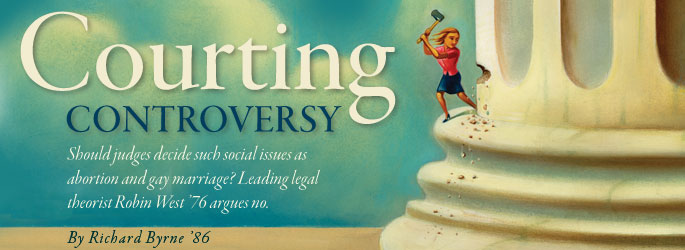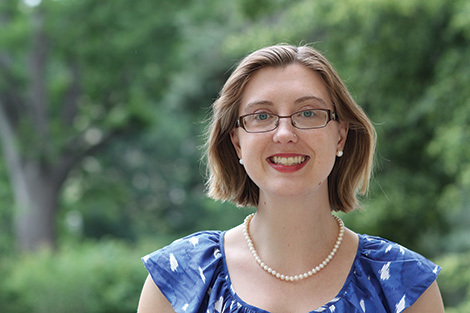Are rulings by judges the best way to settle hot-button social issues such as same-sex marriage and abortion? Maybe not, argues Georgetown University law professor and UMBC alumna Robin L. West.
By Richard Byrne ’86
Illustrations by Chris Buzelli
Justice is a concept that can enflame our passions and animate our actions. The urge to seek redress for wrongs is woven into the fibers of our government, our economy and our culture.
Courts of law are the main venue in which citizens seek justice. So it puzzles UMBC alumna Robin L. West ’76, philosophy – one of America’s preeminent legal scholars – that our nation’s legal establishment and its law schools have largely devalued and dismissed the concept of justice itself.
“In Paper Chase-type movies and in stereotypical accounts of law school,” West observes, “first-year students will often make an argument about a case being just or unjust. And they’ll be shot down by a professor for having said something overly emotional or childish, something inappropriate or not sufficiently thoughtful, or not sufficiently grounded in theory.”
As the Frederick J. Haas Professor of Law and Philosophy and an associate dean at Georgetown University Law Center, West has pursued her interest in legal justice in law and in literature through a dizzying array of books and papers. She now ranks among the most prominent and prolific legal scholars in the nation.
West’s investigations of the philosophy and history behind American legal justice have also prodded progressives to rethink their reliance on courts as the ultimate decider on hot-button issues such as same-sex marriage and abortion.
In books like Reimagining Justice (2003), West argues that contemporary ideas of legal justice have a historical and institutional tilt toward conservatism and libertarianism. In their place, she proposes a vision of American justice that creates greater social cohesion and acknowledges the positive and essential roles that government and politics play in public life.
A weak concept of legal justice “becomes a self-fulfilling prophecy if nobody ever thinks about it, if nobody develops ideas about it, if nobody ever argues about it,” says West.
Justice on the Cutting Room Floor
That law schools and the legal system itself are dismissive of justice seems counterintuitive. Don’t Supreme Court judges answer to the formal title “Justice?”
But West observes that this state of affairs has both a long history and a powerful ripple effect in American culture: “The bad rap that justice has dates back to the late 19th century, when the various approaches to law that were competing for credibility in the legal academy both – for different reasons – dismissed justice.”
Those movements were called “legal formalism” and “legal realism.” Both philosophies are significant building blocks for today’s jurisprudence.
“The formalists gave us the case method – one of the modern ways of legal reasoning,” West says. “Basically they viewed justice as unnecessary; they thought that law was sufficient to answer all legal questions. You could do it all through deductive reasoning. The realists thought that where there were gaps in legal reasoning, the gaps should be filled with the social sciences, which were just emerging as a major way of thinking about political issues at the beginning of the 20th century. So for these different reasons, both camps put justice on the cutting room floor.”
West observes that these movements also aligned with a third notion: the idea that a lawyer’s education should reflect the proper role of law in society and focus on the courts as opposed to the legislatures which create laws. The concept of law as a defender of the individual right against political power has deep roots in the Enlightenment and is manifest in the U.S. Constitution’s Bill of Rights.
“We inherit these ideas about the state potentially being the overreaching Leviathan, and our needing common law and judges to clamp down on it,” says West. “That then gets blended with our constitutional ideas. Separation of powers, individual rights, and so on. What you get out of this by the middle of the 20th century is a lot of rhetoric and ideology and philosophy about the role of law as that which constrains politics. Why does the rule of law clamp down on the state? It’s in order to free the individual to do what they’d do if the state wasn’t there.”
This is a narrow view, argues West, which not only casts the state as a perpetual bad guy, but also negates any useful role for politics.
“Oftentimes the law serves other and nobler and life-enhancing purposes,” she observes, “where the state has to step in and protect people from pernicious private power – or protect people against natural disaster or inevitable tragedy. You don’t get that sense of law intruding into the social world for good ends from the rhetoric of law as the counter to the evil state that emerges from the common law period.”
West suggests that one corrective is for law schools to “open up the subject of what legislatures ought to do to inquiry and study and teaching…The question of the common good has been left out of legal education for the most part. Why? Because the common good, the social good, is what legislators do.”
Courts as a Dead End?
As a legal theorist, West has expended a great amount of energy puzzling through a conundrum: If the dominant notion that law exists largely to police the state for its infringements on individual rights has such a profoundly libertarian and conservative tilt, then why have progressives embraced the courts as a primary vehicle for social change?
West’s work points to a number of problems with that tactic. The first? Courts are far from immutable. They do change – and largely as a result of politics. One example, observes West, is the Supreme Court’s ruling earlier this year in Citizens United v. Federal Election Commission – which struck down a key provision in federal campaign finance law which limited corporate expenditures in elections.
“The main way to think about that case among [progressive] constitutional scholars is to say that the case is just wrong,” says West. “And I have no quarrel with that. But it also is representative of the dominance of constitutional thinking on liberal political action that comes out of law schools. It’s a bit of getting hoisted on your own petard. You have several generations having gone through the legal academy thinking that the Supreme Court is the vehicle for progressive policy, and that the way to go about it is to have the Supreme Court do something that clamps down on the political branches. OK. So here you have the Supreme Court doing something that clamps down on the political branches. And the result is pretty much a disaster across the board.”
West argues that choosing to litigate social change has boxed in progressives. “Somehow we’ve gotten into the position – we, meaning, basically progressives and liberals – of constantly turning to the Supreme Court to decide these questions of fundamental political choices,” she says. “You keep going to the courts to represent things like social welfare, and you’re just wasting your time. The time would be better spent organizing people.”
The problem manifests itself clearly in legal wrangling over same-sex marriage and abortion.
In the case of same-sex marriage, West observes, the conceptually attractive notion of “formal equality” – or “treating like cases alike” –which dominates current legal thinking tends to run aground on the issue of how to decide what constitutes a married couple: traditional male-female pairings only or stated desire by two people to be married, regardless of gender.
“We have not thought very deeply or thoroughly about the politics of marriage per se,” West observes. “Instead, we take marriage as a given, and then ask why these people are treated like these people. It’s a classic ‘treating likes alike.’
“But what’s gotten completely dropped from that conversation is whether marriage – as presently constructed – well serves people,” West continues. “Obviously, it serves some people really nicely. Other people it doesn’t serve so well at all, particularly, for example, folks who want to parent and are poor. Why? Because if they want to parent but can’t access marriage – can’t find someone they want to marry – they’re disadvantaged quite substantially by virtue of not being married but wanting to parent.”
Rights aside, West points out, the stakes remain high: “The number of privileges and economic goodies that married partners have simply by virtue of being married number in the thousands. It’s an extraordinary statistic.”
Marriage’s role as a de facto social safety net may have made sense in the 19th century, she adds, but the present world of single parenthood and extended life spans present different challenges for today’s families.
“When you constitutionalize something like same-sex marriage,” she says, “you’re limited to talking about whether this couple is like that couple, rather than opening up the question of what’s being served by virtue of the state’s role in marriage. Some of it may be worth retaining. Other parts of it may be worth thinking through and doing differently.”
Abortion rights are another issue where West sees the courts as a dead end for progressives. She points out that the Supreme Court’s 1972 Roe v. Wade decision legalizing abortion has been under steady assault since the day the ruling was announced. Now, it may hang on a single vote.
“I think it was unfortunate that that issue was constitutionalized,” West says. If keeping abortion rights legal is a progressive goal, she continues, “Roe v. Wade and its aftermath are not doing a very good job right now. The list just goes on and on of the undermining of Roe through state legislation.”
West argues that pro-choice advocates should place greater faith in politics and organizing. “I don’t think it’s true that the political process is going to yield these horrific results on the abortion side,” she says. In fact, the emphasis on the courts as a battleground for the issue has created “this huge brain drain of smart pro-choice people focusing entirely on litigation and courts, rather than on organizing in those states where it seems like a little organization might help.”
By the Book
Literature has been another wellspring in West’s work on justice. She is one of the leading figures in the law and literature movement – which gleans insight about the law from novels, plays and other literary forms.
West distinguishes between this sort of analysis and cultural studies – which examines representations of law in popular media. Her work mines novels and stories by Herman Melville (Billy Budd), Tom Wolfe (I Am Charlotte Simmons) and Franz Kafka to illuminate legal argumentation on capital punishment, war crimes and definitions of non-consensual sex and rape.
Her interest in this sub-discipline of law came from reading Kafka’s work and realizing the dualities of his occupations as writer and as a lawyer.
“I was reading a biography of Kafka and about his career as a law student, and then as a lawyer,” West recalls. “He was a workman’s comp lawyer, processing workman’s compensation claims. So he knew a lot about law. It wasn’t just a day job. It was a pretty demanding day job. It’s not one that you could just do in your sleep. And it turned out that he did think a lot about law.
“So it dawned on me that you might be able to read some of these parables and short stories he had written – as well as The Trial – and see what Kafka said about law itself,” she says, “and not just law as a metaphor for something else like ‘the father’ or ‘religion.’”
West’s work consciously harks back to the law and literature movement’s heyday in the 1970s and 1980s, when the scholars who worked in it sought to recapture and reevaluate philosophical ideas about the nature of law expressed in great works of fiction. What can lawyers – and even the larger public – take from the conflict between competing notions of law and conscience in Herman Melville’s Billy Budd? That novella’s depiction of its title character – tangled in a knot of false accusations and murder that leads to his execution – raises many of the same compelling questions about justice and law that West investigates in her work.
“A lot of Herman Melville’s work has to do with law,” West observes. “People have been thinking about what Melville had to say about law in Billy Budd since its publication. And it’s interesting to trace the different critical theories about what Billy Budd is about through the decades, because you can really see political differences.”
Tags: Fall 2010, Georgetown University, professor, Robin L. West





